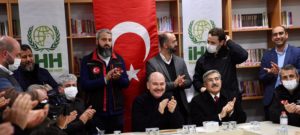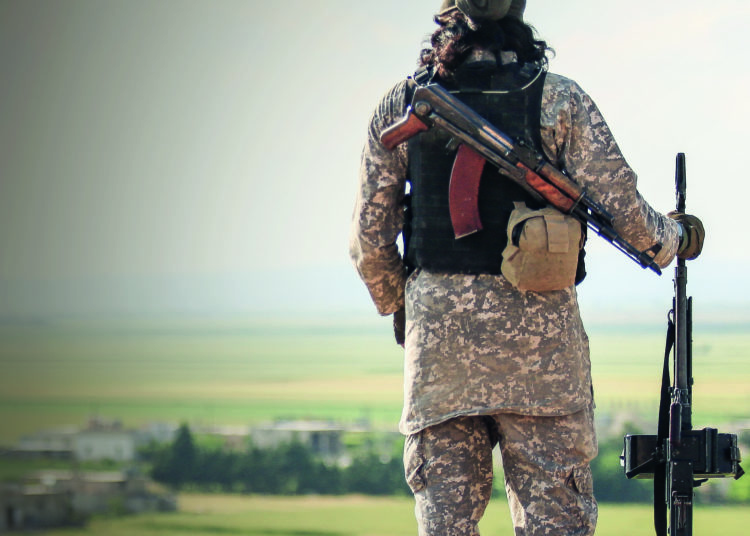Abdullah Bozkurt/Stockholm
A recent UN report on al-Qaeda and the Islamic State in Iraq and Syria (ISIS) shows that armed jihadists continue to operate in Syria’s Idlib region, which is under the control of the Turkish Armed Forces.
“The Idlib de-escalation zone remains important for ISIL as a strategic location providing limited safe haven; some ISIL activity is noted near the Turkish border. Hay’at Tahrir al-Sham (HTS) remains the predominant terrorist group in the north-west of the Syrian Arab Republic and in control of Idlib,” the report states.
According to the report, which was submitted to the UN Security Council on February 3, 2022 by experts assigned to the UN Analytical Support and Sanctions Monitoring Team, HTS, formerly known as the Al-Nusrah Front, has up to 15,000 fighters and generates revenue mainly through taxation in the region. Some of the humanitarian aid sent to Idlib was diverted to HTS, the report also notes.
Another group that operates in Idlib is the Turkistan Islamic Party (TIP), formerly known as the Eastern Turkistan Islamic Movement (ETIM), which commands a force of between 1,000 and 3,000 fighters. The UN received intelligence that TIP members operate under the command of HTS and collaborate with al-Qaeda groups such as Hurras al-Din (HAD) and Katiba al-Tawhid wal-Jihad (KTJ). The group has reportedly been seeking to recruit and send fighters to Central Asian countries and China for terrorist attacks.
TIP established several training camps in Syria, recruiting and training foreign terrorist fighters. It also set up a staging area for the transit, funding and recruitment of fighters, among other logistical support.
The UN report also drew attention to the risks associated with the jihadists who try to return to their home countries through Turkey. It highlighted the case of Yassine Lachiri, a Belgian-Moroccan ISIS fighter who was detained in Bulgaria in November 2021 after arriving from Turkey. Lachiri is an associate of Abdelhamid Abaaoud, the mastermind of the 2015 Paris attacks. It remains a mystery as to how Lachiri managed to enter Bulgaria despite the fact that he received a prison sentence in Turkey.
Full text of the UN report:
Turkey’s name also came up in connection with Islamic State in Iraq and the Levant – Khorasan (ISIL-K), which controls some territory in Afghanistan. The group has demonstrated a continuing ability to mount sophisticated attacks, adding to the complexity of the security situation in Afghanistan, the UN said. One UN member state provided information to the UN stating that Ismatullah Khalozai, the alleged financial facilitator for ISIL-K, delivered approximately $87,000 to the group in Afghanistan and personally smuggled an ISIS courier from Afghanistan into Turkey.
The UN warned that Afghanistan has the potential to become a safe haven for Al-Qaeda, ISIS-K and a number of terrorist groups with ties to the Central Asia region and beyond. With regard to Africa, ISIS and al-Qaeda groups have continued to advance, the report noted, adding that those groups have successfully exploited local grievances and weak governance in West Africa, in particular in the Sahel, to command growing numbers of followers and resources.

In Syria and Iraq, described as the ISIS core conflict zone, the jihadist group has evolved into a primarily rural insurgency, withstanding sustained counterterrorism pressure from forces in the region.
According to the UN estimation, ISIS still possesses as much as $50 million and continues to fund its operations in many places.
On February 3, 2022 US military forces carried out a counterterrorism operation in Idlib province, killing Amir Muhammad Sa’id al Salbi al Mawla, also known by his nom de guerre Abu Ibrahim al-Hashimi al-Qurayshi, the leader of ISIS. Qurayshi assumed the leadership after the US killed former ISIS leader leader Abu Bakr al Baghdadi, again In Idlib, close to the Turkish border. He had been hiding in a town called Atme, located north of Idlib and just east of the border with Turkey. The area is controlled by HTS.
Idlib remains the last rebel stronghold in Syria for anti-regime forces as well as terrorist groups. In 2017 it was designated one of four de-escalation zones in an agreement among Russia, Iran and Turkey. Since then multiple clashes have erupted, putting Turkish-Russian relations to the test. Turkey has shown unwillingness to rein in terrorist groups, especially HTS, which controls Idlib, while Russia has signaled time and again that it can help the Bashar al-Assad regime take over the province by force and unleash a new refugee influx to Turkey.












